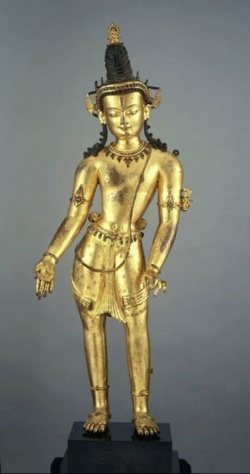Ārūpya-dhātu
ārūpya-dhātu (Sanskrit; Pāli; Arūpaloka (Tib: gzugs med pa'i khams) , arūpa-dhātu). The Formless Realm; the most subtle of the three levels of existence (triloka) according to Buddhist cosmology. This realm is totally devoid of all materiality and suffering. None of the beings inhabiting it has either shape or location; and correspondingly, the realm has no location either. This realm belongs to those devas who attained and remained in the Four Formless Absorptions (catuḥ-samāpatti) of the arūpadhyānas in a previous life, and now enjoy the fruits (vipāka) of the good karma from that accomplishment. Bodhisattvas, however, are never born in the Ārūpyadhātu even when they have attained the arūpadhyānas.
It comprises four states:
boundless space (ākāśa-anantya),
boundless consciousness (vijñāna-anantya),
nothingness (ākiñcanya), and
neither-ideation nor
non-ideation (naivasaṃjñā-nāsaṃjñā).
Birth in these states is achieved through mastery of one of the four corresponding attainments (samāpatti) but despite the extremely tenuous nature of existence in this realm, it still forms part of saṃsāra and beings residing there will eventually return to lower states of existence when the force of their merit (puṇya) or good karma is exhausted.
ārūpya-dhātu: The sphere of immateriality. This is subdivided into four progressive stages (bhūmi):
1.ākāśānantyāyatana,
2.vijñānāntyāyatana,
3.ākiṃcanyāyatana;
4.naivasaṃjñānāsaṃjñāyatana.
